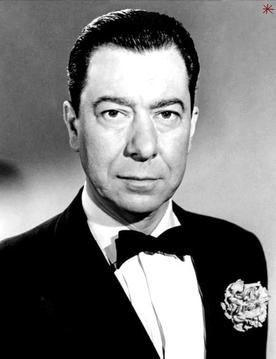Paul Meurisse
| Paul Meurisse | |
|---|---|

Paul Meurisse in Les Diaboliques
|
|
| Born |
Paul Gustave Pierre Meurisse 21 December 1912 Dunkirk, France |
| Died | 19 January 1979 (aged 66) Neuilly-sur-Seine, France |
| Resting place | Neuilly-sur-Seine community cemetery |
| Occupation | Actor |
| Years active | 1940 – 1979 |
Paul Meurisse (French pronunciation: [pɔl møʁis]; 21 December 1912 in Dunkirk – 19 January 1979 in Neuilly-sur-Seine) was a French actor who appeared in over 60 films and many stage productions. Meurisse was noted for the elegance of his acting style, and for his versatility. He was equally able to play comedic and serious dramatic roles. His screen appearances ranged from the droll and drily humorous to the menacing and disturbing. His most celebrated role was that of the sadistic and vindictive headmaster in the 1955 film Les Diaboliques.
Meurisse was born in Dunkirk, on the north-east coast of France, but grew up on the island of Corsica, to where his bank manager father had been transferred when Meurisse was a small child. After leaving school he moved to Aix-en-Provence, where he became a solicitor's clerk. His passion was for the stage, and he obtained evening work in the chorus of music hall revues.
In 1936, Meurisse moved to Paris, where he found work in musical theatres and nightclubs and appeared with performers such as Marie Dubas. He specialised in taking cheerful, upbeat songs and singing them in a comically downbeat, lugubrious fashion.
In 1939, Meurisse met Edith Piaf, and the two became lovers for two years. Piaf however did not see a future for Meurisse as a singer, and encouraged him to try his hand at acting instead.
Meurisse's first screen role came in Vingt-quatre heures de perm, filmed in 1940 but not released until 1945. Ne bougez plus (1941) was the first of his films to be released. Thereafter his acting services were always in demand (in 1948 for example he was credited in no fewer than seven films). Meurisse played a wide range of roles, from gangsters (Macadam, Impasse des Deux-Anges) and policemen (Inspecteur Sergil, Le Dessous des cartes) to comedy (the Monocle films) and historical (La Castiglione, L'Affaire des poisons). The quality of the films was variable, but Meurisse's versatility meant that his performance was often considered the best part of an otherwise mediocre effort.
...
Wikipedia
